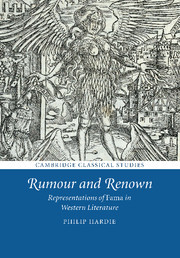Rumour and Renown Representations of Fama in Western Literature Cambridge Classical Studies Series
Langue : Anglais
Auteur : Hardie Philip

Major study of the literary treatment of rumour and renown across the canon of authors from Homer to Alexander Pope.
The Latin word fama means 'rumour', 'report', 'tradition', as well as modern English 'fame' or 'renown'. This magisterial and groundbreaking study in the literary and cultural history of rumour and renown, by one of the most influential living critics of Latin poetry, examines the intricate dynamics of their representations from Homer to Alexander Pope, with a focus on the power struggles played out within attempts to control the word, both spoken and written. Central are the personifications of Fama in Virgil and Ovid and the rich progeny spawned by them, but the book focuses on a wide range of genres other than epic, and on a variety of modes of narrating, dramatising, critiquing and illustrating fama. Authors given detailed readings include Livy, Tacitus, Petrarch, Chaucer, Spenser, Shakespeare, Ben Jonson and Milton.
1. Introduction; 2. Hesiod and Homer: Virgilian beginnings; 3. Virgil's Fama; 4. Fame and defamation in the Aeneid; 5. Ovid: Metamorphoses; 6. Later epic: Lucan, Statius, Valerius Flaccus, Nonnus; 7. Roman historiography I: Livy; 8. Roman historiography II: Tacitus; 9. Fama and Amor; 10. Fame and blame: Spenser; 11. Christian conversions of Fama; 12. Petrarch: Trionfi, Africa; 13. Fama and power in early modern England: Shakespeare, Ben Jonson; 14. Milton: Samson Agonistes; 15. Plots of fame: Chaucer, Alexander Pope; 16. Visual representations of Fama.
Philip Hardie is a Senior Research Fellow at Trinity College, Cambridge, and Honorary Professor of Latin Literature in the University of Cambridge. He is one of the leading critics of Latin literature, with strong interests in the reception of classical literature, and is the author of Virgil's Aeneid: Cosmos and Imperium (1986), The Epic Successors of Virgil (1993), Ovid's Poetics of Illusion (2002) and Lucretian Receptions (2009), the editor of The Cambridge Companion to Ovid (2002) and co-editor of The Cambridge Companion to Lucretius (2007). He is currently co-editing the Renaissance volume of The Oxford History of Classical Reception in English Literature. He is a Fellow of the British Academy.
Date de parution : 12-2014
Ouvrage de 706 p.
17.2x24.5 cm
Date de parution : 02-2012
Ouvrage de 706 p.
18.5x25.3 cm
Thème de Rumour and Renown :
© 2024 LAVOISIER S.A.S.



